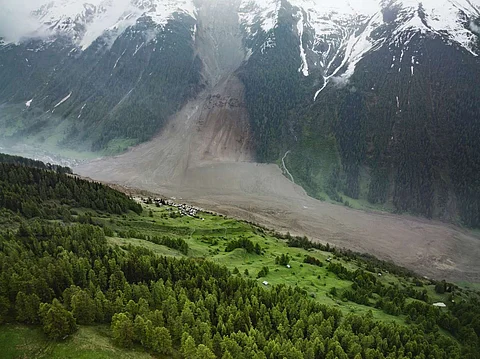
- Destinations
- Experiences
- Stay
- What's new
- Celebrating People
- Responsible Tourism
- CampaignsCampaigns
- SubscribeSubscribe
- Buy Now

Recently, much of the Swiss Alpine community of Blatten was found covered in tonnes of ice, rock and mud after a large chunk of Birch Glacier in Switzerland fell into the Lötschental Valley on May 28, 2025. Local authorities warned all 300 inhabitants to leave the region owing to further warnings of glacier instability. The calamity took place at 3:30 pm. According to the most recent information disseminated from the site, one person still remains unaccounted for in the natural calamity.
Authorities ordered Blatten to be completely evacuated in the days before the collapse due to lesser landslides and indications of glacier instability. Since around 90 per cent of the settlement was buried in debris after the glacier collapsed, this preventive step probably avoided huge casualties.
Large portions of Blatten, a municipality in the Valais canton that is part of the UNESCO World Heritage Site Jungfrau-Aletsch protected region of Switzerland, were damaged by the landslip. The Lonza River was partially obstructed by debris from the collapse, which raised worries about possible flooding and additional environmental effects.
Rescue crews are still searching for the lone missing person despite difficult conditions brought on by the unstable terrain and large volumes of debris. In order to avert more catastrophes, authorities are also evaluating the structural soundness of the village's remaining areas and keeping an eye on the Lonza River's obstructed sections.
The Birch Glacier's collapse highlights the increasing risks that climate change poses to alpine glacier stability. According to studies, ice loss has doubled since the early 2000s, indicating that climate change is hastening the melting of the world's alpine glaciers. High summer temperatures have been especially harmful in the Alps, causing glaciers to retreat quickly.
The disaster underscores the growing threats posed by climate change on glacial stability in alpine regions. Officials had anticipated the risk, but the scale of the collapse was unprecedented, emphasising the increasing dangers associated with warming temperatures and melting glaciers.
The collapse of Birch Glacier serves as a clear reminder of the direct and palpable effects of climate change. There is an urgent need for thorough monitoring and preventative actions to protect populations and the environment as alpine regions grow more susceptible to such calamities.
